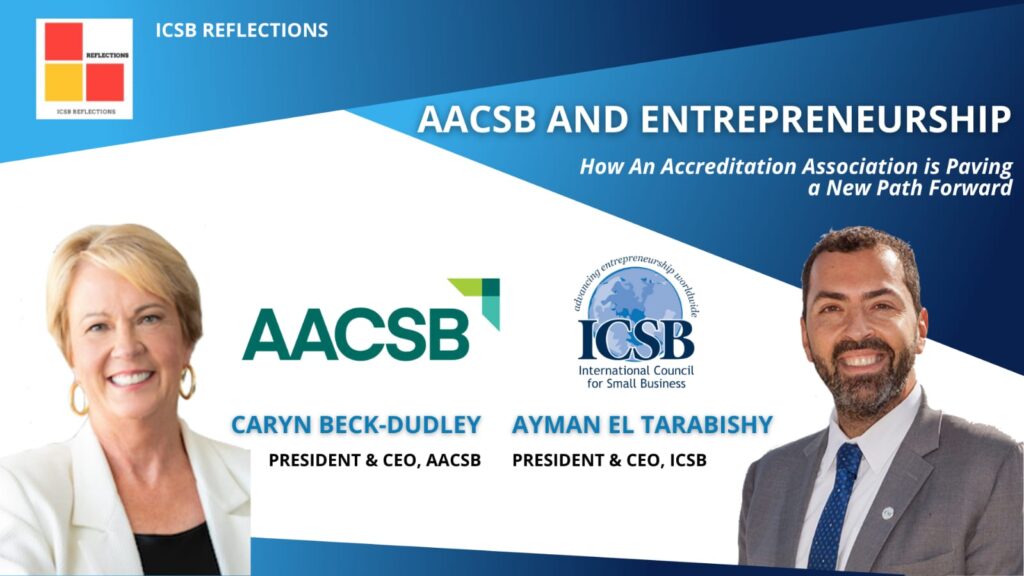Leonardo da Vinci once famously wrote, “To develop a complete mind: Study the science of art; study the art of science. Learn how to see. Realize that everything connects to everything else.” The polymath innovator was able to see in the 16th century what many in the 21st are just now learning: nothing in this world exists in a vacuum. We are all a part of a larger community with a duty to lean on each other in times of need. Where one of us fails, we all fail. Where one of us succeeds, we all succeed. If we want to drive forward progress, we have to all work together towards a common goal.
It is precisely this concept of a common goal and the interconnectedness of everything that led the Association to Advance Collegiate Schools of Business (AACSB) to rethink, reinvent, and redesign their Business Accreditation Standards in 2020. Inspired by the motto to be a force for good in society, the team at AACSB––led by president and CEO Caryn Beck-Dudley––pulled inspiration from the world around them through this process. Amidst the coronavirus pandemic that turned the world as we knew it into something blurred and distorted, there was ample opportunity to construct new standards that would create a more precise, stronger future filled with a new generation of leaders encouraged to be the change they wish to see in the world.
At the 7th Annual California Entrepreneur Educators Conference (CEEC), Beck-Dudley opened the conference on da Vinci’s birthday with a keynote address that laid out exactly how the new standards were devised, signifying a change in how business schools would move into the future. Thinking about everything on a global scale, AACSB has accepted the responsibility of preparing the next generation of leaders to help societies grow around the globe. Whereas the old standards emphasized “hard” skills, including learning theory behind business practices, analyzing case studies, and researching data, the new standards are principles-based and outcomes-focused. In other words, they have been led by the concept of being proactive rather than reactive, finding upstream solutions to address a problem at its source, and pivoting to where a situation warrants through agility.
Keeping in the spirit of lifelong learning, AACSB redesigned the guidelines to let each business school shine in the light of their mission, visions, and values. Beck-Dudley emphasized that they needed to change the perception that the former standards were highly prescriptive. The team tackled this challenge by creating guidelines that empower entrepreneurship educators to have maximum impact on the greater good of society through creative means unique to their available resources. While deviations from the AACSB standards were discouraged in the past, that is not the case anymore. Today, ingenuity and agility are highly encouraged. Essentially, by leading with new guidelines, as opposed to strict standards, the schools have more room for creativity, innovation, and a pioneering spirit in hopes that new generations of entrepreneurs can feel supported as they learn through experience and not through theory alone. With these new standards, business schools will have more creative freedom within their programs, act with integrity based on guidelines rather than strict rules, and see the potential in and encourage entrepreneurial thinking that could change the world.
In addition to sharing the updated guidelines in her keynote, Beck-Dudley emphasized two significant behavioral changes needed for how the universities and their faculty operate. First, tying into the concept of everything in the world is inextricably linked. Business schools need to partner with other departments to solve the issues that lie before them. Suppose everyone stays solely in their respective lanes and forgets to communicate with one another. In that case, we will miss out on the essential collaboration and idea-generating results from considering a wide array of perspectives. Not only is it imperative that we share resources and ideas, but we also need to share our failures so that we can all learn from our mistakes, Beck-Dudley noted.
Furthermore, Beck-Dudley highlighted the importance of the older generations being open to change, as well. She discussed how the younger scholars in entrepreneurship are open to innovation and creative solutions. Still, it can sometimes be difficult for more established professors and researchers to do the same. In her own life, Beck-Dudley had to confront how she was resistant to change, as well. Hence, she empathizes with the reticence even while serving as proof that you can be an expert in your field and not only be open to new ways of thinking but eventually pave the way forward for future generations.
In many ways, the new AACSB Business Accreditation Standards embody the spirit of all that Humane Entrepreneurship represents. By seeing the new generation of business students and future entrepreneurs as whole human beings, by leading with empathy and other “soft” skills, we can change the way the world operates by focusing on the community as a whole. To complement this, Beck-Dudley shared feedback from test schools that first received the new standards. By being caring and genuine, with the best intentions in mind, the schools felt supported and optimistic about their futures, not to mention energized to find solutions to the challenges they faced.
By seeing the value in the entire business program, made up of unique and multifaceted beings with enormous potential, AACSB has demonstrated how important it is to give entrepreneurs the skills they need to flourish and not act as yet another limitation greatness that is human innovation. Meanwhile, the pandemic has proven that everything is connected, more than we ever thought possible before. We need to honor that and move into the future together, developing our business schools and our newest entrepreneurs and leaders accordingly.
After all, Beck-Dudley posed the question in her keynote address, “If we’re not making a positive impact, what are we doing with our time?”



